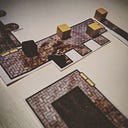Distancing from the Frontier Myth (Them Deeper Bones design diary 12)
Them Deeper Bones is my retro adventure fantasy role-playing game that can be found over on https://themdeeperbones.com/ (as of writing this, version beta.1.5.0). You can get the full playtest documents and supplemental materials by joining the Them Deeper Bones discord. Or if you don’t want to join a social media channel, or just want to help me fund some art to the books, you can get also the books from itch.io.
This time I’ll open the real life cultural myths that are touchstones of the Black Shield Canton setting and how it draws from a different cultural approach than the standard Frontier Myth so inbuilt to the classic TTRPGs.

Richard Slotkin, defines the myth of the frontier as “America as a wide-open land of unlimited opportunity for the strong, ambitious, self-reliant individual to thrust his way to the top.” (from Wikipedia)
And if you squint just right, that’s the formula for the classic form of a Fantasy TTRPG, from its very beginnings in written form from the likes of “The Keep on the Borderlands.” Especially this is form-fitting in hexcrawl games where the frontier of the myth is very much the wild world beyond the towns. A place where the would-be hero can show their strength and by conquering the untamed wilds come back victorious.
Out there, nature itself is an antagonist to be bested. If there are intelligent creatures, they are often depicted as monsters, or tribal orcs of one sort or another, there to provide a sense of superiority to the player characters. Who by their nature as brave souls coming from civilisation’s embrace, are exceptional and possibly even destined to do bring law’s light to the chaos of this wilderness.
If there are others who come from the civilisation to these frontier lands, they are either brave, exceptional heroes, like the PCs, or bandits who don’t fit in with the life inside the borders, becoming outlaws for the characters to fight against as near-equals.
For me, as a Finn, the frontier myth is a second-hand story. It’s been served to me through the pop-culture lens. It’s not one of those that I’ve internalised through my own culture. So the story of going to the untamed wilds and bending it to my will is not internalised. For me exploration of the wild leans on two other myths that I’ve actually grown up with. The magical nature of the forest and the lost Karelian territory.
The Magical Wilderness
The first touchstone for me is that of the forest just beyond the road being a magical place, habited by older and more potent powers. This association probably comes from tales I heard as a kid to make sure I didn’t accidentally drown or get lost in the woods, but the result is a certain reverence to the wilderness. It’s a powerful place, full of danger. But it’s not one to be bested, or bent to my will. I have to respect it and follow its rules, and I’ll be fine.
For me, there are mystical creatures and beings in the wild. Trolls, fair folk, ghosts, goblins, intelligent animals and gods of various sorts. These wondrous embodiments of that untainted wild hold a primal power that is considered lost to the “civilised man”. True magic and powers beyond our comprehension. Those we come across should always be treated with respect, and although conflict is sometimes inevitable (you venture somewhere you shouldn’t have and anger something that lives there), it’s not something we actively drive towards, but more than often try to avoid.
If there are treasures out there in the pure nature, they are not there as rewards from killing or proving your might. They come because they are there. Nature does not care for your antics. It’s indifferent and vastly powerful.
The Karelian Myth
The closest thing culturally to the Frontier Myth that I have that I can connect to as being something of “our own” as a Finn is probably Karelia Lost, or some mythical version of it. I’ll say upfront that I don’t have a direct connection to Karelia, familial or otherwise, but still personally the idea of some part of my country being lost in war before I was born has shaped how I think of what’s out there beyond the borders. We lost large land areas as part of World War 2 and when I was a kid, I felt there was a communal sense of loss about it.
So, in a stark contrast to the Frontier, the tribes of savages, and brave settlers, my cultural heritage makes me think of the border as something, when crossed, is filled with ruins of our own past and some other civilisation inhabiting the areas. Usually in my mind a more powerful civilisation than ours. When dealing with intelligent things out there, it’s a journey to the occupied wilds.
And one that can be abused as much with the stereotypes of “the other” as the Frontier Myth, with more Tolkinesque “evil empire of orcs” instead of “savage tribe of orcs”. This is probably one of the reasons in Them Deeper Bones I’ve focused on a timespan that distances from such easy outs. The cataclysm that serves as the backdrop of the default setting of the game happened lifetimes ago and if there are people behind the border, they actlually have nothing to do with what happened back then. But still, the ruins out there are ours.
Ripe to be explored and studied.
So strap up your adventuring gear, and head out to the wonderful unknown that is very much yours.
